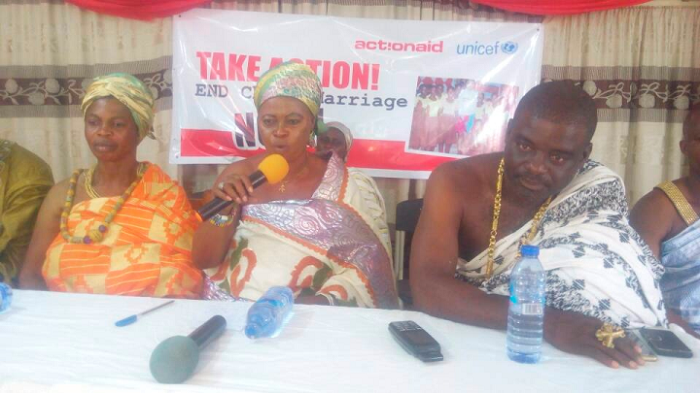Traditional rulers in the Brong Ahafo Region have declared their support to efforts by the government and non-governmental organisations to halt increasing cases of child marriage in the region.
At a press conference organised by ActionAid and the United Nations Children’s Fund (UNICEF) to draw attention to the phenomenon, which was attended by a number of traditional authorities, the organisers expressed concern about the situation and pledged to use all their powers to assist them.
Statistics available from the 2014 Ghana Demographic and Health Survey (2014 GDHS) indicate that the region recorded 29.8 per cent increase in cases of child marriage, which serves as one of the major contributory factors to maternal mortality and low level of girl-child education in the region.
Prevalence of child marriage
The three identified districts noted to have the highest rate of child marriage prevalence are Tain, Atebubu-Amantin and Banda districts.
In these three districts, one out of four girls or both parties are married before their 18th birthday on the average.
In an interview with the Daily Graphic during the press conference, the Brong-Ahafo Regional Programme Manager of ActionAid Ghana, Madam Melody Azinim, expressed worry over the increasing number of early marriages in the region.
She was grateful to the traditional rulers for their involvement in the efforts to address the problem, especially in the three districts, and appealed to parents to also come up with measures to support the advocacy campaign to end the canker.
Complications and implications
Madam Azinim said there were a lot of complications associated with early child marriage, which threatened the health of the adolescent girl before, during and after delivery.
She said most of the children who were involved in child marriages were not mature enough to go through the delivery process, adding that there were several challenges in marrying early, as the practice had negative implications for families and the country’s socio-economic development since victims were unable to fully contribute their quota to fully support their families and the country’s economic development.
She explained that the practice also reduced the human capital available for the growth of the country, as millions of children failed to gain the necessary skills and knowledge that the country so desperately needed.
Madam Azinim said there were laws prohibiting child marriage, but the problem was on how to ensure effective enforcement by severely punishing those who flouted such laws.
She added that through advocacy programmes, community members had begun to see the negative effects of child marriage and its implications.
Madam Azinim appealed to parents to take the education of the girl-child seriously, and counsel their girl-children to stay away from early marriage.
Good relationship
The President of the National Queenmothers Association, Nana Abena Boatemaa, called on parents to monitor and create a good relationship with their children to enable them to identify their needs and assist them when the need arose.

